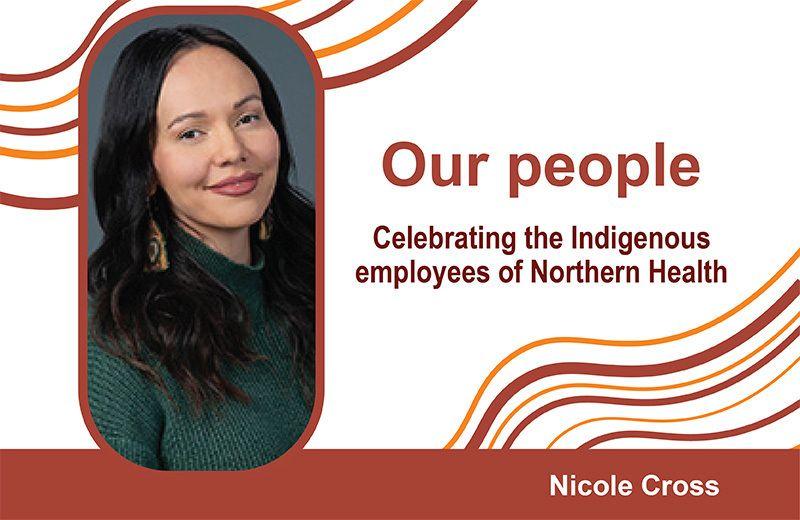June is Indigenous History Month. This is a time for all Canadians – Indigenous, non-Indigenous, and newcomers – to reflect on and celebrate the history, heritage, and diversity of First Nations, Inuit, and Métis Peoples in Canada.
At Northern Health, we want to celebrate our Indigenous colleagues who contribute in countless ways to help us uphold our commitment to building a health system that honours diversity and delivers culturally safe services by providing respectful and inclusive programs and initiatives across Northern BC.
Whether they are an Indigenous Patient Liaison, a Nurse Practitioner, or the VP of Indigenous Health, the Indigenous employees of Northern Health are our friends and neighbours, and we want to get to know them better! To that end, we’ll be sharing interviews and conversations with Indigenous workers at Northern Health about their roles and experiences in their professions during the month of June.
Nicole Cross: VP Indigenous Health, Prince George, BC
Why did you want to work in health care?
I always wanted to be involved in health. I first wanted to be a veterinarian and I was the welcoming committee for all the stray pups in the village and any injured animals. As I grew older in my early teen years, I grew to love biology and wanted to pursue a career in health care as I knew our communities deserved more… that they deserved the best, and I wanted to help with that.
What means the most to you about your job?
Seeing people’s world perspective change when they get connected to our communities - when they can see, in depth, the strength and beauty of our communities and nations, and the knowledge and positive impact our nations do/can/will have on improving health care.
Seeing good people flourish and succeed in meaningful challenging work is extremely gratifying to me. Helping people’s ideas for improvement and change become a reality (whether that be staff, colleagues, patients and community).
Who is your inspiration in health care?
CHRs. Community Health Reps were our everything growing up. They delivered babies, ran our growing up groups, checked our heads (haha) and were a safe and supportive space for openness and dialogue on health. I watched them provide such dedicated and thoughtful care to everyone, from babies to our elders.
As I grew up, various Health Directors across the North continue to inspire me, as well as leaders at FNHA and NH.
What inspires you in health care?
My kids and our communities.
What was a significant moment for you in your career?
I was a new mom needing to find work and I was having such a hard time finding health related work and was about to give up and work in a Telus call centre to pay the bills. When I got a call back from two jobs, one was work with the community of Tsay Keh Dene (first as a grant writer, and then Health Director) and I worked part time as an Aboriginal Patient Liaison under the guidance of June Moise at UHNBC. Shortly after this, I was recruited to FNHA as their second staff in the North and I was the 71st staff member of what was then the First Nation Health Society, which then became the FNHA and then the FNHA we know today. The rest was history.
How did you get where you are today?
I was so privileged with the leaders that I met along the way in health care. I learned so much from every community I worked with (the Health Directors and Chiefs), organizations like Carrier Sekani Family Services (CSFS) and Prince George Native Friendship Centre (PGFNFC) as well as the leaders in the early years of FNHA who created such open space for creativity and action and our partners at NH, especially Cathy Ulrich and her executive team, were always there to encourage and support and share advice along the way.
What was your best day at work?
Any day I get to be in community, but especially if I get to visit a smokehouse or watch how people process food. I grew up spending a lot of time with my grandmother, mom, aunties and brothers processing food at different times of the year. It fascinates me and makes me feel at peace learning and hearing how others do this work.
What does it mean to you to be an Indigenous person in health care?
It’s a huge responsibility to oneself, family and the communities. It’s incredibly personal at its core and that is amazing and exhausting at times. It is a privilege to be in a role like mine. When I think about all of those in our community that gave everything they could to care for us, to encourage us so we could be in positions to drive change and share the lessons we learned with the hopes of healthy vibrant and strong communities and families… I am incredibly humbled to play a small role in that work and carry on those lessons.














Comments